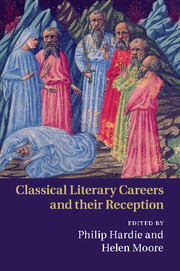Book contents
- Frontmatter
- Contents
- List of contributors
- Preface
- Note on the text
- Introduction: Literary careers – Classical models and their receptions
- 1 Some Virgilian unities
- 2 There and back again: Horace's poetic career
- 3 The Ovidian career model: Ovid, Gallus, Apuleius, Boccaccio
- 4 An elegist's career: from Cynthia to Cornelia
- 5 Persona and satiric career in Juvenal
- 6 The indistinct literary careers of Cicero and Pliny the Younger
- 7 Re-inventing Virgil's Wheel: the poet and his work from Dante to Petrarch
- 8 Did Shakespeare have a literary career?
- 9 New spins on old rotas: Virgil, Ovid, Milton
- 10 Bookburning and the poetic deathbed: the legacy of Virgil
- 11 Literary afterlives: metempsychosis from Ennius to Jorge Luis Borges
- 12 ‘Mirrored doubles’: Andrew Marvell, the remaking of poetry and the poet's career
- 13 Dryden and the complete career
- 14 Goethe's elegiac sabbatical
- 15 Wordsworth's career prospects: ‘peculiar language’ and public epigraphs
- Epilogue: Inventing a life – a personal view of literary careers
- List of works cited
- Index
11 - Literary afterlives: metempsychosis from Ennius to Jorge Luis Borges
Published online by Cambridge University Press: 10 November 2010
- Frontmatter
- Contents
- List of contributors
- Preface
- Note on the text
- Introduction: Literary careers – Classical models and their receptions
- 1 Some Virgilian unities
- 2 There and back again: Horace's poetic career
- 3 The Ovidian career model: Ovid, Gallus, Apuleius, Boccaccio
- 4 An elegist's career: from Cynthia to Cornelia
- 5 Persona and satiric career in Juvenal
- 6 The indistinct literary careers of Cicero and Pliny the Younger
- 7 Re-inventing Virgil's Wheel: the poet and his work from Dante to Petrarch
- 8 Did Shakespeare have a literary career?
- 9 New spins on old rotas: Virgil, Ovid, Milton
- 10 Bookburning and the poetic deathbed: the legacy of Virgil
- 11 Literary afterlives: metempsychosis from Ennius to Jorge Luis Borges
- 12 ‘Mirrored doubles’: Andrew Marvell, the remaking of poetry and the poet's career
- 13 Dryden and the complete career
- 14 Goethe's elegiac sabbatical
- 15 Wordsworth's career prospects: ‘peculiar language’ and public epigraphs
- Epilogue: Inventing a life – a personal view of literary careers
- List of works cited
- Index
Summary
As well as providing paradigms for the literary life, ancient authors and texts have also furnished highly influential models for what may be termed the literary afterlife. That is to say, ancient works have led later writers to envision and present their predecessors, and their relationships to those predecessors, in highly specific ways. This essay explores how one ancient trope has been used for these purposes over the long period indicated by my title, together with some other metaphorical concepts into which it has ramified during the last two centuries.
Since Joyce intended Ulysses to contain everything, it naturally contains a reference to metempsychosis, when, in the ‘Calypso’ episode, Molly asks Bloom to explain the word in a book she is reading. The reference is fleeting; Joyce wishes to avoid labouring Bloom's role as reincarnation of Odysseus:
– Metempsychosis?
– Yes. Who's he when he's at home?
– Metempsychosis, he said, frowning. It's Greek: from the Greek. That means the transmigration of souls.
– O rocks! She said. Tell us in plain words …
– Some people believe, he said, that we go on living in another body after death, that we lived before. They call it reincarnation. That we all lived before on the earth thousands of years ago or some other planet. They say we have forgotten it. Some say they remember their past lives.
Bloom's ‘some other planet’ is misinformation, but the rest of his informal definition is substantially correct.
- Type
- Chapter
- Information
- Classical Literary Careers and their Reception , pp. 209 - 225Publisher: Cambridge University PressPrint publication year: 2010
- 3
- Cited by

